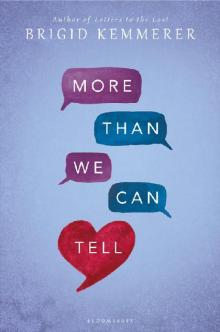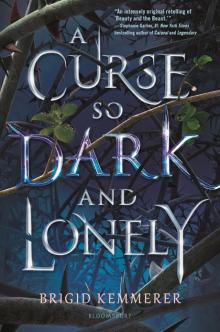- Home
- Brigid Kemmerer
Call It What You Want Page 6
Call It What You Want Read online
Page 6
He says nothing else, just continues eating his banana. He does it slowly, the way he eats a cheese sandwich. Tiny bites.
I have absolutely no idea what to do with this. It’s weird. Invasive. I’m tempted to stand up and go find another table.
But then Connor Tunstall himself stops beside this one.
WTF is up with my day?
“Hey, Rob,” he says, his voice full of mocking brightness. “Find a new friend?”
I don’t look at him. “Go to hell.”
Across from me, Owen continues to eat his banana with meticulous precision.
Connor leans down close to him. For an instant, I’m worried he’s going to be a total shit to Owen, but I should know better.
“Don’t trust anything he says. Rob knows how to run a con.”
I keep my eyes on my book. The sword-wielding centurions on the page could have started a massive orgy, for all I know. The words have become a swirling mass of anger and regret.
Owen swallows the piece of banana he was chewing. “I’ll keep my eyes open.” I can’t tell if his tone is sarcastic or genuine.
Not like it matters. I wish he hadn’t sat down.
My jaw is so tight I’m seeing stars. “Go away, Connor.”
“I’m looking out for a classmate. You understand, right?”
I shove up from the bench, and like yesterday, he flinches almost imperceptibly.
But then he laughs and turns away. “Careful, Lachlan. The last thing you need is a suspension.”
It takes me a minute to sit back down. Owen is still picking at his banana. His bizarre collection of snacks sits on the tray beside him.
“So, you know how people say the opposite of love is hate?” he says.
I frown. This is the most surreal lunch period ever. “What?”
“My mom once said that’s not true. She said the opposite of love is indifference. She said love and hate both require directing energy at someone. I think I’m seeing that in action.”
I am so confused. “What the hell are you talking about?”
“That guy. Connor. He used to be your friend, right?”
“So?”
“It’s not like you can turn that off. I mean, isn’t that why divorced people hate each other?”
“I wasn’t in love with him, I was—” I break off and make a frustrated sound. “Why are you even sitting here? What do you want?”
“I don’t know.” He shrugs. His face is no longer red. “I guess I was trying to figure out why you gave me the money.”
I run a hand back through my hair and close my book. “I don’t know.”
“Yeah you do.”
“God. Fine.” I’m angry now, and most of it has nothing to do with Owen. “Because I felt bad. Is that what you want me to say? I felt bad that you have to eat a cheese sandwich every day.”
He finishes his banana and balls up the peel. He tosses it at a trash can at least fifteen feet away—and to my surprise, he makes it.
He doesn’t touch anything else on the tray. “Did you know what your dad was doing?”
After eight months, he’s the first person to ever ask me that question in a direct manner.
“No,” I say.
“Okay.” He shrugs and starts shoving all the other snacks into his backpack.
That’s it? I take a breath to demand more information, but then I let it out. I don’t deserve more of an explanation. “Why did you just buy snacks?”
He zips up his bag but makes no move to leave the bench. “Because they’ll last longer.”
Oh. Oh.
And he only ate one banana. I want to ask why he didn’t get his trusty cheese sandwich, but maybe they won’t give him one if he shows up at the register with money.
I tear a strip of paper from my lunch bag, then set half my roast beef sandwich on it and push it across the table.
Owen hesitates, then says, “Thanks.”
I shrug. He shrugs.
And then we eat, and we don’t say anything else.
CHAPTER TWELVE
Maegan
Mom likes to whisper when she’s talking about things you don’t say in polite company. Samantha and I have known about sex since fifth grade, but Mom will still drop to a hushed voice when she mentions anything even close to it. You’d think that the wife of a cop wouldn’t flinch from a word like heroin or affair, but when Mom wants to make a commentary about the drug problem in the community or our next-door neighbor’s proclivities, she acts like she’s shielding our precious ears.
Our supposed innocence doesn’t stop her from talking about these things. It stops her from talking about them at a normal volume.
Tonight, at the dinner table, she’s whispering the word abortion.
“I told you I don’t want to talk about it yet,” Samantha snaps. She grabs a piece of garlic bread from the pile on the table.
Dad clears his throat. He’s only been home for twenty minutes, so he’s still in his uniform. His low voice rumbles as he puts his hand over Mom’s. “Maybe this isn’t the time or place, Allison.”
“She needs to make a decision,” Mom hisses, as if our conversation is being recorded. “Her future is at stake.”
“I’m not going to have the baby under the table in the next twenty minutes,” Samantha says.
“You’re already ten weeks pregnant, and I think you’re being very cavalier about this.” Mom points her fork at Samantha. “I think that’s how you got into this situation. You always think you know best, but sometimes you don’t.”
Samantha takes a long sip of chocolate milk. The combination with spaghetti and meat sauce is enough to turn my stomach, but she said it’s the only thing that calms hers. “I didn’t hear you complaining when my cavalier attitude won me this scholarship.”
“Oh, and what’s going to happen to that scholarship if you decide to keep this baby? What’s going to happen if you take a month to make a decision?”
“Are you telling me to get an abortion?” Samantha asks. “You want me to kill your grandchild?”
Mom pales a shade. She might have been okay with an abortion, but it’s obvious the grandchild angle didn’t occur to her. She swallows so hard I hear it. “Samantha. I’m asking you to look at your options. Have you talked to the athletic director?”
“No.”
“Surely you aren’t the first girl to get pregnant while on a scholarship.”
“So I get rid of the baby or I get rid of my future.” Samantha tears another piece of garlic bread in half. “Great.”
“No one is telling you to get rid of the baby,” Mom snaps. “But I’m asking you to stop hiding in your room and deal with the problem you created.”
“Yeah, I created it all by myself. The turkey baster was so sexy. You should try it, Mom. Might spice up your—”
“Enough.” My father’s voice doesn’t rise much. It doesn’t have to. We both know when to shut up.
Silence falls like a woolen blanket.
“You’re not going to talk to your mother that way,” he says to Samantha. “Do you understand me?”
She shoves the second piece of bread into her mouth and doesn’t look at him. Her cheeks are faintly pink.
I spin pasta on my fork and keep my eyes fixed on my plate. I would rather be anywhere than at this dinner table. Literally anywhere.
I’m meeting Rob at seven. Sixty minutes away.
I don’t know if I can last that long.
“You keep refusing to talk about the boy,” Dad says. “Can you share his feelings on the matter?”
The word boy throws me, because David isn’t a boy at all. The spaghetti in my mouth turns to stone. I hate secrets. Especially the secrets of other people.
Samantha doesn’t answer him. The silent tension in the room grows by leaps and bounds.
Mom sets down her silverware. Quietly. Then she smooths her napkin over her lap. When she speaks, her voice is softer. “Maybe we should talk to his parents about setting up a fami
ly meeting. Do they live near the university? We could meet somewhere in the middle.”
Samantha takes a drink of milk.
I force down another forkful of spaghetti.
We’ve all been sitting here in silence for a while.
Finally, Samantha says, “He doesn’t think it’s his.” Her voice is so quiet we can barely hear her over our breathing.
Beside me, my father’s fingers curl into a fist. I’m not sure if he’s mad at Samantha or this “boy,” but either way, it’s never good to be on the wrong side of my father’s temper. “He what?”
“He doesn’t think it’s his.” Samantha swallows. “He—”
“He what?” says our mother.
“Nothing.”
My father’s voice, usually a low, calming rumble, is lethally quiet. “Is it his?”
“Yes.” Samantha’s voice breaks. A tear snakes down her cheek.
“You’re sure?”
“Yes.”
“Then I want his name and phone number. I’m going to call him myself. I’m not going to watch you go through this on your—Where are you going?”
Samantha has burst from her chair and bolted through the kitchen doorway.
A sob escapes her as she tears up the stairs. A moment later, a door slams.
My father sighs and twists his fork in his pasta. His voice is tight. “This is ridiculous. I want you to find out who this boy is, Allison. We pay for her phone. If she’s not going to give us information, I’m going to figure it out on my own.”
Then he points his fork at me. “Not a word to her about that, either. You hear me?”
I squeak and nod quickly.
He sighs, then reaches over and squeezes my forearm. “I’m sorry. I’m not mad at you. You always do the right thing.”
But then he goes still, as if he’s realized what he’s said. He looks back at his food. I look back at mine.
The table falls silent for a while, broken only by the crunch of garlic bread. They haven’t asked me one single thing since we sat down at the dinner table, and I am one hundred percent okay with that.
My phone chimes. Rachel.
RACHEL: Drew is working and I’m bored. Want to see a movie?
MAEGAN: Can’t. Meeting Rob Lachlan to work on our project.
RACHEL: Awkward
MAEGAN: Tell me about it
But as soon as I send the message, I regret it. I replay our late-night meeting at Wegmans. It was definitely awkward—mostly because of me—but it was also sad.
He seems so lonely. I don’t think I ever realized that. His eyes lit up when he mentioned lacrosse scholarships, but that light burned out so quickly when he remembered his current situation.
“Do you really want her to have an abortion?” Dad says softly.
“I don’t know,” says Mom. Her voice is thin and reedy. “I don’t know what to do.”
My chest is so tight it hurts. We aren’t religious, and I’ve always considered myself pro-choice.
It’s a lot easier to say that when the choice isn’t staring you in the face.
“I don’t like it,” Dad says. Then he sighs. “I don’t like the idea of her having a baby at nineteen, either.”
“Even if they let her defer for a year,” says Mom, “how is she going to keep up a sports scholarship while raising a baby?”
“There’s always adoption,” Dad says.
“Are you going to hand over our grandchild?” says Mom.
“Would you rather she kill it?”
I can’t be here for this.
“Can I borrow your car?” I say to Mom.
She sniffs. “What, Maegan?”
“We have a group project in calculus, and we’re meeting at Wegmans. Is that okay?”
She smiles at me, but her eyes are watery and distracted. Mentally, she’s still fixated on my sister. “Oh. Yes. Of course. Go ahead.”
Today, I’m the one with schoolbooks spread across a table in the upstairs eating area. I’m half an hour early, but I had to get out of there. I can’t listen to the abortion debate in the middle of our kitchen. Every time someone says kill it, I want to throw up.
I need to think about calculus.
I can’t think about calculus.
I try to imagine my vivacious, unpredictable sister giving up lacrosse and school to raise a baby. And what would she do for a job? She can’t live with Mom and Dad forever. Besides, Mom and Dad both work. Would the baby have to go to day care so Samantha could keep going to school? Could Mom and Dad afford that? I remember one of our teachers had a baby and came back for a week after maternity leave, then quit. She said she had to work a week to keep what they paid her during her maternity leave—but if she kept working, most of her salary would have to pay for day care. She didn’t want to work so someone else could raise her daughter.
Then again, we were in day care when we were young, because Mom was a graphic designer, and she didn’t want to give up her career. So it’s not like a baby automatically closes the door for Samantha.
But Mom had Dad around to help pay expenses, so they were able to make it work. Samantha wouldn’t have that. DavidLitMan probably isn’t going to write a rent check every month.
Would he pay child support? Would that cover rent?
I never realized this would be so complicated—and I’m not even the one making the decision.
I have a plan to go sit on the bench outside and wait for Rob, kind of an apology for jumping down his throat yesterday, but he surprises me by showing up at six forty.
He’s startled to see me. He pulls ear buds out of his ears, then pulls his phone out of his pocket, checking the time. “Hey. I thought maybe I was late.”
“No.” I hesitate. “My house is a little weird now. I had to get out.” I almost ask if he wants to get coffee or a soda or something, but it seemed to throw him last night. I don’t say anything.
He drops his backpack on the floor beside a chair, then sits. “My house is weird, too.” No further explanation—but maybe none is needed. He pulls out his textbook. “I was going to do the homework while I was waiting … or do you want to go right to the project?”
I want something other than fetal brain development to occupy my thoughts.
“Whatever,” I say. “I haven’t done the homework yet, either.”
His eyes narrow slightly, like he’s trying to figure me out. “Want to get it out of the way?”
“Sure.”
I sit there and stare at my textbook. I can’t make myself care about math when I can’t stop thinking about my sister.
I wish I knew what she wanted to do.
I’m not going to have the baby under the table in the next twenty minutes.
It sounds like what she really wants to do is procrastinate. Or maybe I’m just channeling my mother.
“What’s up?” Rob’s quiet voice makes me jump.
“What?”
“You haven’t written anything down.”
I look down at my notebook. He’s right. For some reason, that’s a surprise. “Oh.”
He sets down his pen. His voice affects a breathy falsetto. “I care about my grades. You can’t slack off on this.”
Checkmate. Hearing my own words recited back makes me sound like a real shrew. I blush and fold in on myself. “I’m sorry. You’re right. I’ll work.”
“I’m messing with you. I haven’t written anything down, either.”
I look across. His notebook is equally blank. His expression seems to match how I feel.
“We have to do something,” I say.
“Okay. I’ll do the first problem and you do the second, and we can copy each other’s.”
I sit up straight. “You—wait. That’s—that’s cheating.”
He hesitates, and I can almost hear the question before he asks it. Why do you care about cheating on homework if you blew the whole SAT?
But he doesn’t ask. He says, “It’s not a test. You can check my work and I’ll check yours.�
�
This feels like a decidedly gray area. I’m already on rocky ground. I don’t know if I like it or not.
Rob shrugs and looks back at his paper. His expression is closed off again. “Forget it,” he says quickly. “It doesn’t matter. I can do them all.”
He puts his pencil to the page.
I look at my own book. If I do four problems instead of eight, I’m still working. And he’s right—by virtue of copying over his answers, I’ll be working through the problem to make sure he solved it accurately. It’s not like copying a research report or an English paper.
I bite my lip.
I write 2. halfway down my page.
Then I do the second problem.
It takes a few minutes, not including the time I spent hesitating. When I finish and look up, Rob is watching me.
“What? I can break the rules once in a while.”
His eyes hold mine. “I’ve heard that.”
I don’t flinch from his gaze, though I want to. “You were right. We can check each other’s work when we copy over. What’s the difference?”
“Agreed.” He pauses. “Want to do three and four?”
“Sure.” We work through the rest of the assignment. My thoughts are burning for a new reason, but I’m kind of glad for the change.
When I’m near the end of the eighth problem, Rob says, “What makes your house weird?”
I tense, but then he adds, “Is it because your dad’s a cop?”
My pencil goes still on the paper. “What?”
My voice is sharper than I intended, mostly because I was thinking about my parents’ arguing at the dinner table, not what’s in front of me. Rob looks back at his notebook. “Sorry. I didn’t mean to pry.”
“No … it’s fine. I don’t understand the question.”
“Is it weird, your dad being a policeman? Is he on your case all the time?”
I shrug and set down my pencil. “It’s not weird. It’s kind of all I’ve ever known.” I pause, thinking of last spring, when Samantha learned about her full scholarship. How I walked into that testing room, thinking I’d never do anything that would measure up to my sister’s success. “Dad expects a lot from us.”
“I remember that feeling,” says Rob, and I go still.

 More Than We Can Tell
More Than We Can Tell Sacrifice
Sacrifice Fearless
Fearless A Curse So Dark and Lonely
A Curse So Dark and Lonely Elemental
Elemental Thicker Than Water
Thicker Than Water Storm
Storm Spirit
Spirit Spark
Spark Defy the Night
Defy the Night Call It What You Want
Call It What You Want A Vow So Bold and Deadly
A Vow So Bold and Deadly A Heart So Fierce and Broken
A Heart So Fierce and Broken Breathless
Breathless Breathless (Elemental)
Breathless (Elemental) Secret (Elemental)
Secret (Elemental)